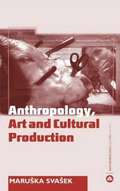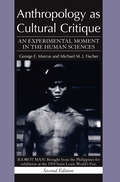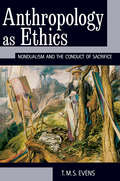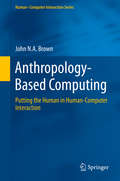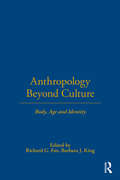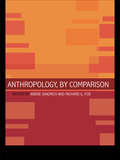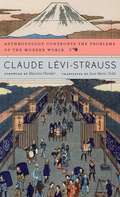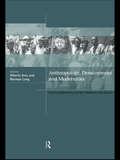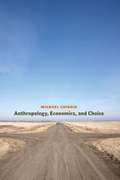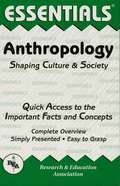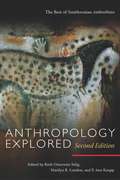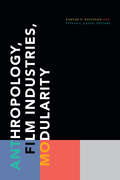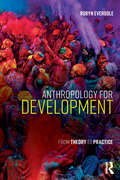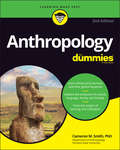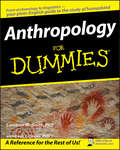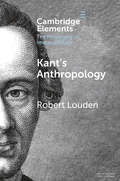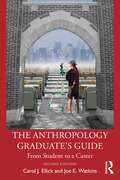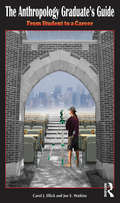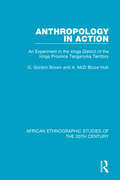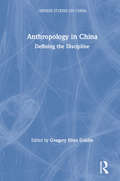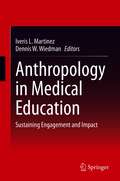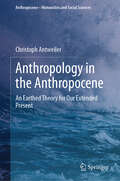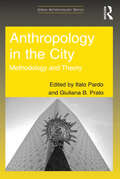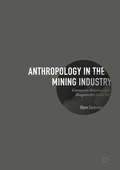- Table View
- List View
Anthropology, Art and Cultural Production
by Maruska SvasekThis book provides an introduction to anthropological perspectives on art. Svasek defines art as a social process. We study not only the artefacts themselves and the values attributed to them, but also the process of production and its wider context. Providing a critical overview of various anthropological theories of art, Svasek offers a new perspective which centres on the analysis of commoditisation, aestheticisation and object agency. She explores the process of collecting and exhibiting art works and how this relates to art's production, distribution and consumption in an increasingly global market. The book outlines the significance of art and aesthetics in everyday life, and examines the shifting boundaries between art and other categories such as kitsch, souvenirs, propaganda and pornography. Finally, Svasek argues for an anthropological perspective that links the production and consumption of artefacts to political, religious and other cultural processes. Ideal as a teaching text, this book gives a detailed overview of themes that are central to the fields of art history, art sociology and cultural studies.
Anthropology as Cultural Critique: An Experimental Moment in The Human Sciences, Second Edition
by George E. Marcus Michael M. J. FischerUsing cultural anthropology to analyze debates that reverberate throughout the human sciences, George E. Marcus and Michael M. J. Fischer look closely at cultural anthropology's past accomplishments, its current predicaments, its future direction, and the insights it has to offer other fields of study. The result is a provocative work that is important for scholars interested in a critical approach to social science, art, literature, and history, as well as anthropology. This second edition considers new challenges to the field which have arisen since the book's original publication.
Anthropology as Cultural Critique: An Experimental Moment in the Human Sciences
by George E. Marcus Michael M.J. FischerUsing cultural anthropology to analyze debates that reverberate throughout the human sciences, George E. Marcus and Michael M. J. Fischer look closely at cultural anthropology's past accomplishments, its current predicaments, its future direction, and the insights it has to offer other fields of study. The result is a provocative work that is important for scholars interested in a critical approach to social science, art, literature, and history, as well as anthropology. This second edition considers new challenges to the field which have arisen since the book's original publication.
Anthropology As Ethics: Nondualism and the Conduct of Sacrifice
by T. M. S. Terry EvensAnthropology as Ethics is concerned with rethinking anthropology by rethinking the nature of reality. It develops the ontological implications of a defining thesis of the Manchester School: that all social orders exhibit basically conflicting underlying principles. Drawing especially on Continental social thought, including Wittgenstein, Merleau-Ponty, Levinas, Dumont, Bourdieu and others, and on pre-modern sources such as the Hebrew bible, the Nuer, the Dinka, and the Azande, the book mounts a radical study of the ontology of self and other in relation to dualism and nondualism. It demonstrates how the self-other dichotomy disguises fundamental ambiguity or nondualism, thus obscuring the essentially ethical, dilemmatic, and sacrificial nature of all social life. It also proposes a reason other than dualist, nihilist, and instrumental, one in which logic is seen as both inimical to and continuous with value. Without embracing absolutism, the book makes ambiguity and paradox the foundation of an ethical response to the pervasive anti-foundationalism of much postmodern thought.
Anthropology-Based Computing: Putting the Human in Human-Computer Interaction (Human–Computer Interaction Series #0)
by John N.A. BrownWe have always built tools to improve our productivity and help us lead better lives; however we find ourselves constantly battling against our new computerized tools, making us less productive and putting our health and our lives at risk. This book looks at Human-Computer Interaction (HCI) from a truly human-centred perspective; focusing on human physiology and psychology rather than the motley series of brilliant innovations, glorified mistakes, and cross-generational habits that comprise the computer-centred HCI that we practice today. This three-part guide argues that human interest and calm technology need to be at the heart of HCI. It begins by exposing the inherent dangers in past and present HCI. Using his past experiences within Anthropology, Linguistics, Education, Ergonomics, Human Factors, and Computer Science the author introduces and explores the theory of 'Anthropology-Based Computing' (ABC) as well as a new ideas like Dynamic Environmental Focus (DEF), a new model of General Human Interaction (GHI), and a new triune model of the brain: Brown's Representation of Anthropogenic Interaction in Natural Settings (BRAINS). Detailed illustrations show how HCI can be improved by considering how human bodies and brains actually work. The final part is a series of simple illustrated experiments, each applying an aspect of ABC to improve the way our computers and computerized devices treat us. Anthropology-Based Computing is written for those who work with computers, not just those who work on them. Students and researchers in Design and Psychology, and Computer Scientists as well, will benefit from seeing what is missing from the devices that are already in place, why that is, and how to make the practical changes that will immediately improve the physiological and psychological experience of using phones, on-board navigation systems, and the countless other computers we use at work and at home today and will continue to use in the future.
Anthropology Beyond Culture (Wenner-Gren International Symposium Series)
by Barbara J. King Richard G. FoxCulture is a vexed concept within anthropology. From their earliest studies, anthropologists have often noted the emotional attachment of people to their customs, even in cases where this loyalty can make for problems. Do anthropologists now suffer the same kind of disability with respect to their continuing emotional attachment to the concept of culture? This book considers the state of the culture concept in anthropology and finds fault with a ‘love it or leave it' attitude. Rather than pledging undying allegiance or summarily dismissing it, the volume argues that anthropology can continue with or without a concept of culture, depending on the research questions being asked, and, furthermore, that when culture is retained, no single definition of it is practical or necessary. Offering sensible solutions to a topic of hot debate, this book will be essential reading for anyone seeking to learn what a concept of culture can offer anthropology, and what anthropology can offer the concept of culture.
Anthropology, by Comparison
by Andre Gingrich Richard G. FoxComparison has long been the backbone of the discipline of anthropology. But recent developments in anthropology, including critical self-reflection and new case studies sited in a globalized world, have pushed comparative work aside. For the most part, comparison as theory and method has been a casualty of the critique of 'grand theory' and of a growing mistrust of objectivist, hard-science methodology in the social sciences.Today it is time for anthropology to resume its central task of exploring humankind through comparison, using its newfound critical self-awareness under changing global conditions. In Anthropology By Comparision, an international group of prominent anthropologists re-visits, re-theorizes and re-invigorates comparison as a legitimate and fruitful enterprise. The authors explore the value of anthropological comparison and encourage an international dialogue about comparative research. While rejecting older, universalist comparative methods, these scholars take a fresh look at various subaltern and neglected approaches to comparison from their own national traditions. They then present new approaches that are especially relevant to the globalized world of the twenty-first century.Every student and practitioner of anthropology and the social sciences will find this thought-provoking volume essential reading. Anthropology, by Comparison is a call to creative reflection on the past and productive action in the present, a challenge to anthropologists to revitalize their unique contribution to human understanding. Anthropology, by Comparison is an indispensable overview of anthropology's roots - and its future - with regard to the comparative study of humankind.
Anthropology Confronts the Problems of the Modern World
by Claude Levi-StraussAnthropology Confronts the Problems of the Modern World is the first English translation of a series of lectures Claude Lévi-Strauss delivered in Tokyo in 1986. Written with an eye toward the future as his own distinguished career was drawing to a close, this volume presents a synthesis of the author’s major ideas about structural anthropology, a field he helped establish. Critiquing insights of his earlier writings on the relationship between race, history, and civilization, Lévi-Strauss revisits the social issues that never ceased to fascinate him. He begins with the observation that the cultural supremacy enjoyed by the West for over two centuries is at an end. Global wars and genocides in the twentieth century have fatally undermined Western faith in humanity’s improvement through scientific progress. Anthropology, however, can be the vehicle of a new “democratic humanism,” broadening traditional frameworks that have restricted cross-cultural understandings of the human condition, and providing a basis for inquiries into what other civilizations, such as those of Asia, can teach. Surveying a world on the brink of the twenty-first century, Lévi-Strauss assesses some of the dilemmas of cultural and moral relativism a globalized society faces-ethical dimensions of economic inequality, the rise of different forms of religious fundamentalism, the promise and peril of genetic and reproductive engineering. A laboratory of thought opening onto the future, Anthropology Confronts the Problems of the Modern World is an important addition to the canon of one of the twentieth-century’s most influential theorists.
Anthropology, Development and Modernities: Exploring Discourse, Counter-Tendencies and Violence
by Alberto Arce Norman LongWhile the diffusion of modernity and the spread of development schemes may bring prosperity, optimism and opportunity for some, for others it has brought poverty, a deterioration in quality of life and has given rise to violence. This collection brings an anthropological perspective to bear on understanding the diverse modernities we face in the contemporary world. It provides a critical review of interpretations of development and modernity, supported by rigorous case studies from regions as diverse as Guatemala, Sri Lanka, West Africa and contemporary Europe.Together, the chapters in this volume demonstrate the crucial importance of looking to ethnography for guidance in shaping development policies. Ethnography can show how people's own agency transforms, recasts and complicates the modernities they experience. The contributors argue that explanations of change framed in terms of the dominantdiscourses and institutions of modernity are inadequate, and that we give closer attention to discourses, images, beliefs and practices that run counter to these yet play a part in shaping them and giving them meaning.Anthropology, Development and Modernities deals with the realities of people's everyday lives and dilemmas. It is essential reading for students and scholars in anthropology, sociology and development studies. It should also be read by all those actively involved in development work.
Anthropology, Economics, and Choice
by Michael ChibnikIn the midst of global recession, angry citizens and media pundits often offer simplistic theories about how bad decisions lead to crises. Many economists, however, base their analyses on rational choice theory, which assumes that decisions are made by well-informed, intelligent people who weigh risks, costs, and benefits. Taking a more realistic approach, the field of anthropology carefully looks at the underlying causes of choices at different times and places. Using case studies of choices by farmers, artisans, and bureaucrats drawn from Michael Chibnik's research in Mexico, Peru, Belize, and the United States, Anthropology, Economics, and Choice presents a clear-eyed perspective on human actions and their economic consequences. Five key issues are explored in-depth: choices between paid and unpaid work; ways people deal with risk and uncertainty; how individuals decide whether to cooperate; the extent to which households can be regarded as decision-making units; and the "tragedy of the commons," the theory that social chaos may result from unrestricted access to commonly owned property. Both an accessible primer and an innovative exploration of economic anthropology, this interdisciplinary work brings fresh insight to a timely topic.
Anthropology Essentials (REA's Essentials Series)
by Michael AngrosinoREA's Essentials provide quick and easy access to critical information in a variety of different fields, ranging from the most basic to the most advanced. As its name implies, these concise, comprehensive study guides summarize the essentials of the field covered. Essentials are helpful when preparing for exams, doing homework and will remain a lasting reference source for students, teachers, and professionals. Anthropology discusses human evolution and development, human adaptation to the environment, culture, society, the individual, social organization, social stratification and transaction, symbolic expressions, and anthropology and the future.
Anthropology Explored, Second Edition: The Best of Smithsonian AnthroNotes
by P. Ann Kaupp Marilyn R. London Ruth SeligThis new edition offers a variety of clearly written and readily accessible articles from the Smithsonian's highly acclaimed, award-winning publication AnthroNotes. Some of the world's leading anthropologists explore fundamental questions humans ask about themselves as individuals, as societies, and as a species. The articles reveal the richness and breadth of anthropology, covering not only the fundamental subjects but also the changing perspectives of anthropologists over the 150-year history of their field. Illustrated with original cartoons by anthropoligst Robert L. Humphrey, Anthropology Explored opens up to lay readers, teachers, and students a discipline as varied and fascinating as the cultures it observes.
Anthropology, Film Industries, Modularity
by Ramyar D. Rossoukh and Steven C. CatonFrom Bangladesh and Hong Kong to Iran and South Africa, film industries around the world are rapidly growing at a time when new digital technologies are fundamentally changing how films are made and viewed. Larger film industries like Bollywood and Nollywood aim to attain Hollywood's audience and profitability, while smaller, less commercial, and often state-funded enterprises support various cultural and political projects. The contributors to Anthropology, Film Industries, Modularity take an ethnographic and comparative approach to capturing the diversity and growth of global film industries. They outline how modularity—the specialized filmmaking tasks that collectively produce a film—operates as a key feature in every film industry, independent of local context. Whether they are examining the process of dubbing Hollywood films into Hindi, virtual reality filmmaking in South Africa, or on-location shooting in Yemen, the contributors' anthropological methodology brings into relief the universal practices and the local contingencies and deeper cultural realities of film production.Contributors. Steven C. Caton, Jessica Dickson, Kevin Dwyer, Tejaswini Ganti, Lotte Hoek, Amrita Ibrahim, Sylvia J. Martin, Ramyar D. Rossoukh
Anthropology for Development: From Theory to Practice
by Robyn EversoleAnthropology for Development: From Theory to Practice connects cross-cultural social theory with the concerns of development policy and practice. It introduces the reader to a set of key ideas from the field of anthropology of development, and shows how these insights can be applied to solve real-world development dilemmas. This single, accessibly written volume clearly explains key concepts from anthropology and draws them into a framework to address some of the important challenges facing development policy and practice in the twenty-first century: poverty, participation, sustainability and innovation. It discusses classic critical and ethnographic texts and more recent anthropological work, using rich case studies across a range of country contexts to provide an introduction to the field not available elsewhere. The examples presented are designed to help development professionals reframe their practice with attention to social and cultural variables as well as understand why mainstream approaches to reducing poverty, raising productivity, delivering social services and grappling with environmental risks often fail. This book will prove invaluable to undergraduate and postgraduate students who are professionals-in-training in development studies programs around the world. It will also help development professionals work effectively and inclusively across cultures, tap into previously invisible resources, and turn current development challenges into opportunities.
Anthropology For Dummies
by Cameron M. SmithStudy the science of all of us Anthropology is the organized study of what makes humans human. It takes an objective step back to view homo sapiens as a species and ask questions like: Given our common characteristics, why aren’t all of us exactly the same? Why do people across the world have variable skin and hair color and so many inventive ways to say hello? And how can knowing the reasons behind our differences—as well as our similarities—teach us useful lessons for the future? The updated edition of Anthropology For Dummies gives you a panoramic view of the fascinating fieldwork and theory that seeks to answer these questions—and helps you view the human world through impartial, anthropological eyes. Keeping the jargon to a minimum, Anthropology For Dummies explores the four main subdivisions of the discipline, from the adventurous Indiana Jones territory of archaeology and the hands-on biological insights provided by our physical nature to the studious book-cracking brainwork of cultural and linguistic investigation. Along the way, you’ll journey deep into our prehistory where we begin to differentiate ourselves from our primate relatives—and then fast forward into the possibilities of centuries yet to come. Explore the history of anthropology and apply its methods Get a deep, scientific take on contemporary debates such as identity Excavate the human past through new fossil discoveries Peer into humanity’s future in space Whether you’re studying anthropology for school or just want to know more about what makes us humans who we are, this is the perfect introduction to humanity’s past and present—and a clue to what we need to build a better future.
Anthropology For Dummies
by Cameron M. Smith Evan T. DaviesCovers the latest competing theories in the fieldGet a handle on the fundamentals of biological and cultural anthropologyWhen did the first civilizations arise? How many human languages exist? The answers are found in anthropology - and this friendly guide explains its concepts in clear detail. You'll see how anthropology developed as a science, what it tells us about our ancestors, and how it can help with some of the hot-button issues our world is facing today.Discover:How anthropologists learn about the pastHumanity's earliest activities, from migration to civilizationWhy our language differs from other animal communicationHow to find a career in anthropology
Anthropology from a Kantian Point of View (Elements in the Philosophy of Immanuel Kant)
by Robert B. LoudenKant's anthropological works represent a very different side of his philosophy, one that stands in sharp contrast to the critical philosophy of the three Critiques. For the most part, Kantian anthropology is an empirical, popular, and, above all, pragmatic enterprise. After tracing its origins both within his own writings and within Enlightenment culture, the Element turns next to an analysis of the structure and several key themes of Kantian anthropology, followed by a discussion of two longstanding contested features - viz., moral anthropology and transcendental anthropology. The Element concludes with a defense of the value and importance of Kantian anthropology, along with replies to a variety of criticisms that have been levelled at it over the years. Kantian anthropology, the author argues, is 'the eye of true philosophy'.
The Anthropology Graduate's Guide: From Student to a Career
by Carol J. Ellick Joe E. WatkinsIn this revised edition of The Anthropology Graduate’s Guide, Carol Ellick and Joe Watkins present a set of practical steps that guides the reader through the transition from student to professional, covering a wide range of career options for which an anthropology degree is applicable. It includes an overview of anthropology as a discipline, professional qualifications and key skills, an outline of key jobs and future careers, and guidance on job application materials and interviews, as well as discussions of professional communication styles and the importance of belonging to professional organizations. New to this edition are updates to technology recommendations (portfolio building, Skype and Zoom interviews, social media, etc.), tips for formatting résumés, discussions of navigating harassment and inappropriate behavior, discussions of diversity, social justice, and inclusion, and updated statistics on finding jobs in and out of academia. Ultimately, the stories, scenarios, and activities presented in this book will show a reader how to use knowledge, skills, and abilities learned in the classroom in a career setting.
The Anthropology Graduate's Guide: From Student to a Career
by Joe E Watkins Carol J EllickMom will ask, “What can you do with a degree in anthropology?” If you want the answer, then you need this book. Applied anthropologists Carol Ellick and Joe Watkins present a set of practical steps that will assist you through the transition from your career as a student into a career in a wide range of professions that an anthropology degree can be used. The stories, scenarios, and activities presented in this book are intended to assist you in learning how to plan for the next five years, write your letter of introduction, construct your resume, and best present the knowledge, skills, and abilities learned in class to prospective employers. Ellick and Watkins’ step-by-step approach helps you create a portfolio that you will use time and time again as you build your career.
Anthropology in Action: An Experiment in the Iringa District of the Iringa Province Tanganyika Territory
by G. Gordon Brown A. McD Bruce HuttOriginally published in 1935, when the province of Iringa in what is now Tanzania was still under British administrative control, this book is inevitably a product of its time, but nonetheless it represents an important project in collaboration between an anthropologist and a government official. Factors such as tribal organization and changes of it to aid administration are discussed as well as particular details relating to Hehe marriage and divorce.
Anthropology in China: Defining the Discipline
by Gregory Eliyu GuldinThis book previously published in 2015 as vol. 20, no. 4 and vol. 21, no. 1 of Chinese sociology and anthropology". Seventh section of Chinese Studies on China series.
Anthropology in Medical Education: Sustaining Engagement and Impact
by Iveris L. Martinez Dennis W. WiedmanThis volume reflects on how anthropologists have engaged in medical education and aims to positively influence the future careers of anthropologists who are currently engaged or are considering a career in medical education. The volume is essential for medical educators, administrators, researchers, and practitioners, those interested in the history of medicine, global health, sociology of health and illness, medical and applied anthropology. For over a century, anthropologists have served in many roles in medical education: teaching, curriculum development, administration, research, and planning. Recent changes in medical education focusing on diversity, social determinants of health, and more humanistic patient-centered care have opened the door for more anthropologists in medical schools. The chapter authors describe various ways in which anthropologists have engaged and are currently involved in training physicians, in various countries, as well as potential new directions in this field. They address critical topics such as: the history of anthropology in medical education; humanism, ethics, and the culture of medicine; interprofessional and collaborative clinical care; incorporating patient perspectives in practice; addressing social determinants of health, health disparities, and cultural competence; anthropological roles in planning and implementation of medical education programs; effective strategies for teaching medical students; comparative analysis of systems of care in Japan, Uganda, France, United Kingdom, Mexico, Canada and throughout the United States; and potential new directions for anthropological engagement with medicine. The volume overall emphasizes the important role of anthropology in educating physicians throughout the world to improve patient care and population health.
Anthropology in the Anthropocene: An Earthed Theory for Our Extended Present (Anthropocene – Humanities and Social Sciences)
by Christoph AntweilerIn this book, anthropologist and geologist Christoph Antweiler shows that geology is a special, namely historical, natural science and is therefore relevant for a historically informed anthropology. He argues that we do not only need a geologically informed cultural anthropology, but conversely also an anthropologically oriented geology. A comprehensive geology must include material human culture as a fundamental geological phenomenon. In relation to cultural anthropology, the author discusses the challenge the Anthropocene poses for cultural anthropology as a traditionally micro-oriented social science. The book discusses where the blind spots lie in the highly interdisciplinary discussion. Common narratives are critically scrutinized. The author argues for the need for a new discipline: geoanthropology.
Anthropology in the City: Methodology and Theory (Urban Anthropology)
by Italo Pardo and Giuliana B. PratoWith half of humanity already living in towns and cities and that proportion expected to increase in the coming decades, society - both Western and non-Western - is fast becoming urban and even mega-urban. As such, research in urban settings is evidently timely and of great importance. Anthropology in the City brings together a leading team of anthropologists to address the complex methodological and theoretical challenges posed by field-research in urban settings, clearly identifying the significance of the anthropological paradigm in urban research and its centrality both to mainstream academic debates and to society more broadly. With essays from experts on wide-ranging ethnographic research from fields as diverse as China, Europe, India, Latin and North America and South East Asia, this book demonstrates the contribution that empirically-based anthropological analysis can make to our understanding of our increasingly urban world.
Anthropology in the Mining Industry: Community Relations after Bougainville's Civil War
by Glynn CochraneThis book outlines how Rio Tinto--one of the world's largest miners--redesigned and rebuilt relationships with communities after the rejection of the company during Bougainville's Civil War. Glynn Cochrane recalls how he and colleagues utilized their training as social anthropologists to help the company to earn an industry leadership reputation and competitive business advantage by establishing the case for long-term, on the ground, smoke-in-the-eyes interaction with people in local communities around the world, despite the appeal of maximal efficiency techniques and quicker, easier answers. Instead of using ready-made, formulaic toolkits, Rio Tinto relied on community practitioners to try to accommodate local preferences and cultural differences. This volume provides a step-by-step account of how mining companies can use social anthropological and ethnographic insights to design ways of working with local communities, especially in times of upheaval.
